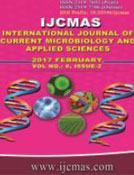


 National Academy of Agricultural Sciences (NAAS)
National Academy of Agricultural Sciences (NAAS)

|
PRINT ISSN : 2319-7692
Online ISSN : 2319-7706 Issues : 12 per year Publisher : Excellent Publishers Email : editorijcmas@gmail.com / submit@ijcmas.com Editor-in-chief: Dr.M.Prakash Index Copernicus ICV 2018: 95.39 NAAS RATING 2020: 5.38 |
The indiscriminate use of agrochemicals since green revaluations resulted in adverse effect on the soil fertility, crop productivity, quality of produce and more specifically on the environmental system. The current scenario under such situations firmly emphasizes the need to adopt eco-friendly agricultural practices for food production by considering the sustainability of soil and environment. The use of cow urine can be considered as a low cost agricultural practice for farmers and had been extensively used in traditional agriculture in India for medicinal and agricultural purposes since Vedic period. Among different organic sources cow urine is good source of nitrogen besides it contains sulphur, phosphate, potassium, sodium, manganese, carbolic acid, iron, silicon, chlorine, salt, enzyme and hormones. It strengthens the fact that cow’s urine is not a toxic effluent as 95% of its content being water, 2.5% urea and the remaining 2.5% a mixture of minerals, salts, hormones and enzymes. It is also considered as a natural disinfectant and pest repellent and forms the main component of Panchagavya, an organic crop booster prepared and sprayed by Indian farmers. As products of ecological sanitation, urine is therefore in many ways suited for use as fertilizer as they contain essential nutrients needed for plant growth. Favourable effect of cow urine application has been reported in enhancing the productivity of different crops viz. maize, mustard and rice etc.
 |
 |
 |
 |
 |